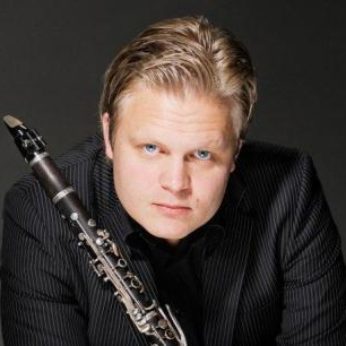Composer: Osvaldo Golijov (b. 1960)
Performance date: 03/07/2013
Venue: Bantry Library
Composition Year: 1994
Duration: 00:37:00
Recording Engineer: Damian Chennells, RTÉ lyric fm
Instrumentation Category:Small Mixed Ensemble
Instrumentation Other: 2vn, va, vc, cl
Artists:
Jupiter String Quartet (Nelson Lee, Meg Freivogel McDonough [violins], Liz Freivogel [viola], Dan McDonough [cello]) -
[quartet]
Christoffer Sundqvist -
[clarinet]

As he describes below, Golijov’s intention in this piece is
to fuse thematic elements of the Jewish klezmer tradition with the form of the
string quartet as found in Brahms and Mozart. The clarinettist takes on the
role of roaring biblical prophet in the savage, uncanny sonorities of the
Aramaic Prelude and first movement, playing B flat, A and bass clarinets. In
the second movement, a Yiddish klezmer dance like no other is created using the
C-clarinet while the quartet pumps and stomps for dear life. The third section
takes on the aspect of a Hebrew prayer with the bass-clarinet prominent,
leading to something like a rabbinical blessing at the end. All this demands
extraordinary concentration and physical effort from the clarinet player, who
is required to maintain a controlled fusion of styles on four different
instruments, while leading the klezmer band in an explosive performance of this
remarkable score, which is played without a break.
Golijov himself describes his work in more temperate tones: Eight centuries ago Isaac The Blind, the
great kabbalist rabbi of
dictated a manuscript in which he asserted that all things and events in the
universe are the product of combinations of the Hebrew alphabet’s letters. Isaac’s
lifelong devotion to his art is as striking as that of string quartets and
klezmer musicians. In their search for something that arises from tangible
elements but transcends them, they are all reaching a state of communion. If
communion is not the reason, how else would one explain the strange life that
Isaac led, or the decades during which groups of four souls dissolve their
individuality into single, higher organisms, called string quartets? How would
one explain the chain of klezmer generations that, while blessing births,
weddings, and burials, were trying to discover the melody that could be set
free from itself and become only air, spirit, ruakh?
The movements of this work sound to me as if written in three of the different
languages spoken by the Jewish people throughout our history. This somehow
reflects the composition’s epic nature. I hear the prelude and the first movement,
the most ancient, in Arameic; the second movement is in Yiddish, the rich and
fragile language of a long exile; the third movement and postlude are in sacred
Hebrew.
The prelude and the first movement simultaneously explore two prayers in different
ways: The quartet plays the first part of the central prayer of the High
Holidays, We will observe the mighty holiness of this day…, while the
clarinet dreams the motifs from Our Father, Our King. The second movement is
based on The Old Klezmer Band, a traditional dance tune, which is surrounded
here by contrasting manifestations of its own halo. The third movement was
written before all the others. It is an instrumental version of K’Vakarat, a
work that I wrote a few years ago for Kronos and Cantor Misha Alexandrovich.
The meaning of the word klezmer:
instrument of song, becomes clear as one listens. This movement, together with
the postlude, bring to conclusion the prayer left open in the first movement: Thou
pass and record, count and visit, every living soul, appointing the measure of
every creature’s life and decreeing its destiny.
But blindness is as important in this work as dreaming and praying. I had
always the intuition that, in order to achieve the highest possible intensity
in a performance, musicians should play, metaphorically speaking, ‘blind’. That
is why, I think, all legendary bards in cultures around the world, starting
with Homer, are said to be blind. ‘Blindness’ is probably the secret of great
string quartets, those who don’t need their eyes to communicate among them,
with the music, or the audience. My hommage to all of them and Isaac of
for blind musicians, so they can play it by heart. Blindness, then, reminded me
of how to compose music as it was in the beginning: An art that springs from
and relies on our ability to sing and hear, with the power to build castles of
sound in our memories.
Copyright © 2024 West Cork Music. All rights reserved.
Designed and developed by Matrix Internet